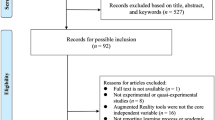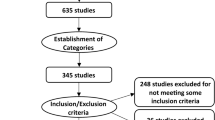Abstract
There’s significant value in following a systematic methodology in educational research, not only to gain valid and reliable empirical data, but also to determine which interventions meet quality indicators and consistently generate expected results. Looking at Special Education, and in line with the necessity for methodological rigor, specific quality indicators to ensure evidence in educational empirical study designs have been developed. In this sense, digital technologies, and recently, immersive technologies are increasingly being used in educational interventions due to the positive learning outcomes seen in cognitive, affective, and psychomotor domains. Nevertheless, the affordances of the technology used in such interventions are hardly considered indicating a research gap worth investigating further. Single subject design seems to support effective instructional interventions because of the unique characteristics of every student with a specific disability. This work introduces Augmented Reality, among other quality indicators, to measure the extent of which the structure of matter is understood by students with Intellectual Disabilities. The empirical study set forth in this paper satisfactorily met all existing quality indicators, in addition to the newly introduced AR technology indicator. Findings showed that the research design of the enriched set of quality indicators increased student motivation and their understanding of abstract Physics concepts. The students with ID acquired targeted physics concepts, as well as inquiry skills thanks to their involvement in a vivid experience. These results point to the contribution of AR technology through its affordances as a new quality indicator among the existing set.
Access this chapter
Tax calculation will be finalised at checkout
Purchases are for personal use only
Similar content being viewed by others
References
Seidel, T., Shavelson, R.J.: Teaching effectiveness research in the past decade: the role of theory and research design in disentangling meta-analysis results. Rev. Educ. Res. 77(4), 454–499 (2007)
Horner, R.H., Carr, E.G., Halle, J., McGee, G., Odom, S., Wolery, M.: The use of single-subject research to identify evidence-based practice in special education. Except. Child. 71(2), 165–179 (2005)
Kratochwill, T.R., Levin, J.R.: Enhancing the scientific credibility of single-case intervention research: randomization to the rescue. Psychol. Methods 15(2), 124–144 (2010)
Cook, B.G., Cook, L.: Research designs and special education research: different designs address different questions. Learn. Disabil. Res. Pract. 31(4), 190–198 (2016)
Cook, B.G., Love, H.R., Cook, L.: Mixed-methods approaches in special education research. Learn. Disabil. Res. Pract. 37(4), 314–323 (2022)
Council for Exceptional Children. TEACHING Exceptional Children 46(6), 206–212 (2014)
Brantlinger, E., Jimenez, R., Klingner, J., Pugach, M., Richardson, V.: Qualitative studies in special education. Except. Child. 71(2), 195–207 (2005)
Gersten, R., Fuchs, L.S., Compton, D., Coyne, M., Greenwood, C., Innocenti, M.S.: Quality indicators for group experimental and quasi-experimental research in special education. Except. Child. 71(2), 149–164 (2005)
Odom, S.L., Brantlinger, E., Gersten, R., Horner, R.H., Thompson, B., Harris, K.R.: Research in special education: scientific methods and evidence-based practices. Except. Child. 71(2), 137–148 (2005)
Kratochwill, T.R., et al.: Single-case intervention research design standards. Remed. Spec. Educ. 34(1), 26–38 (2012)
Talbott, E., Maggin, D.M., Van Acker, E.Y., Kumm, S.: Quality indicators for reviews of research in special education. Exceptionality 26(4), 245–265 (2017)
Knight, V.F., Wood, L., McKissick, B.R., Kuntz, E.M.: Teaching science content and practices to students with intellectual disability and autism. Remed. Spec. Educa. 41(6), 327–340 (2019)
Baragash, R.S., Al-Samarraie, H., Alzahrani, A.I., Alfarraj, O.: Augmented reality in special education: a meta-analysis of single-subject design studies. Eur. J. Spec. Needs Educ. 35(3), 382–397 (2019)
Fernández-Batanero, J.M., Montenegro-Rueda, M., Fernández-Cerero, J.: Use of augmented reality for students with educational needs: a systematic review (2016–2021). Societies 12(2), 36 (2022)
Kang, Y.S., Chang, Y.J.: Using an augmented reality game to teach three junior high school students with intellectual disabilities to improve ATM use. J. Appl. Res. Intellect. Disabil. 33(3), 409–419 (2019)
Montoya-Rodríguez, M.M., et al.: Virtual reality and augmented reality as strategies for teaching social skills to individuals with intellectual disability: a systematic review. J. Intellect. Disabil. (2022)
Yenioglu, B.Y., Ergulec, F., Yenioglu, S.: Augmented reality for learning in special education: a systematic literature review. Interact. Learn. Environ. 1–17 (2021)
Mallidis-Malessas, P., Iatraki, G., Mikropoulos, T.A.: Teaching physics to students with intellectual disabilities using digital learning objects. J. Spec. Educ. Technol. 37(4), 510–522 (2021)
McMahon, D.D., Cihak, D.F., Wright, R.E., Bell, S.M.: Augmented reality for teaching science vocabulary to postsecondary education students with intellectual disabilities and autism. J. Res. Technol. Educ. 48(1), 38–56 (2015)
Gersten, R., Edyburn, D.: Defining quality indicators for special education technology research. J. Spec. Educ. Technol. 22(3), 3–18 (2005)
Carreon, A., Smith, S.J., Mosher, M., Rao, K., Rowland, A.: A review of virtual reality intervention research for students with disabilities in K–12 settings. J. Spec. Educ. Technol. 37(1), 82–99 (2020)
Köse, H., Güner-Yildiz, N.: Augmented reality (AR) as a learning material in special needs education. Educ. Inf. Technol. 26, 1921–1936 (2021)
Mikropoulos, T.A., Iatraki, G.: Digital technology supports science education for students with disabilities: a systematic review. Educ. Inf. Technol. 28, 3911–3935 (2022)
Delimitros, M., Stergiouli, A., Iatraki, G., Koutromanos, G., Mikropoulos, T.A.: A model for the design of immersive learning enactments for students with intellectual disabilities. In: Conference on Software Development and Technologies for Enhancing Accessibility and Fighting Info-Exclusion. ACM (2022)
McDermott, L.C., Shaffer, P.S., Constantinou, C.P.: Preparing teachers to teach physics and physical science by inquiry. Phys. Educ. 35(6), 411–416 (2000)
Pedaste, M., et al.: Phases of inquiry-based learning: definitions and the inquiry cycle. Educ. Res. Rev. 14, 47–61 (2015)
Horner, R.H., Swaminathan, H., Sugai, G., Smolkowski, K.: Considerations for the systematic analysis and use of single-case research. Educ. Treat. Child. 35(2), 269–290 (2012)
Kay, R., Knaack, L.: Developing learning objects for secondary school students: a multi-component model. Interdisc. J. e-Skills Lifelong Learn. 1, 229–254 (2005)
Scruggs, T.E., Mastropieri, M.A., Casto, G.: The Quantitative synthesis of single-subject research: methodology and validation. Rase 8(2), 24–33 (1987)
Scruggs, T.E., Mastropieri, M.A.: How to summarize single-participant research: ideas and applications. Exceptionality 9, 227–244 (2001)
Cheng, S.-C., Lai, C.-L.: Facilitating learning for students with special needs: a review of technology-supported special education studies. J. Comput. Educ. 7(2), 131–153 (2019)
Acknowledgements
The authors would like to thank the students for their participation in the study.
Author information
Authors and Affiliations
Corresponding author
Editor information
Editors and Affiliations
Rights and permissions
Copyright information
© 2024 The Author(s), under exclusive license to Springer Nature Switzerland AG
About this paper
Cite this paper
Iatraki, G., Mikropoulos, T.A. (2024). Introducing a New Technology Quality Indicator for Intervention Design in Special Education. In: Bourguet, ML., Krüger, J.M., Pedrosa, D., Dengel, A., Peña-Rios, A., Richter, J. (eds) Immersive Learning Research Network. iLRN 2023. Communications in Computer and Information Science, vol 1904. Springer, Cham. https://doi.org/10.1007/978-3-031-47328-9_22
Download citation
DOI: https://doi.org/10.1007/978-3-031-47328-9_22
Published:
Publisher Name: Springer, Cham
Print ISBN: 978-3-031-47327-2
Online ISBN: 978-3-031-47328-9
eBook Packages: Computer ScienceComputer Science (R0)




